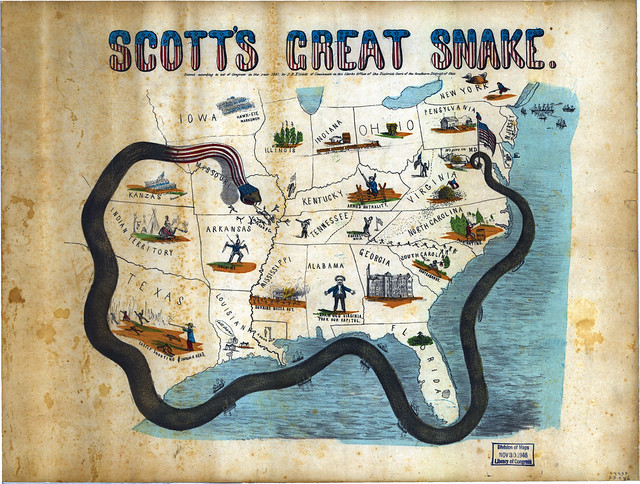
Cartoon map illustrating Gen. Winfield Scott’s plan to crush the Confederacy, economically. It is sometimes called the “Anaconda Plan.”
Headquarters of the Army
Washington, May 3, 1861
Maj. Gen. George B. McClellan,
Commanding Ohio Volunteers, Cincinnati, OH
We rely greatly on the sure operation of a complete blockade1 of the Atlantic and Gulf ports soon to commence. In connection with such blockade we propose a powerful movement down the Mississippi to the ocean, with a cordon of posts at proper points, and the capture of Forts Jackson and Saint Philip; the object being to clear out and keep open this great line of communication in connection with the strict blockade of the sea-board, so as to envelop the insurgent States and bring them to terms with less bloodshed than by any other plan. I suppose there will be needed from twelve to twenty steam gun-boats, and a sufficient number of steam transports (say forty) to carry all the personnel (say 60,000 men) and material of the expedition; most of the gun-boats to be in advance to open the way, and the remainder to follow and protect the rear of the expedition, &c. This army, in which it is not improbable you may be invited to take an important part, should be composed of our best regulars for the advance and of three-years’ volunteers, all well officered, and with four months and a half of instruction in camps prior to (say) November 10. In the progress down the river all the enemy’s batteries on its banks we of course would turn and capture, leaving a sufficient number of posts with complete garrisons to keep the river open behind the expedition. Finally, it will be necessary that New Orleans should be strongly occupied and securely held until the present difficulties are composed.
With great respect, yours, truly
Winfield Scott.
- The strategy was nicknamed the Anaconda Plan in the newspapers because it would strangle the Confederacy the way the anaconda snake constricts its victims.